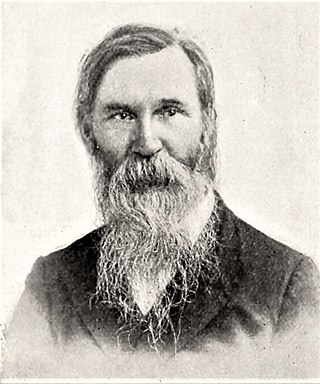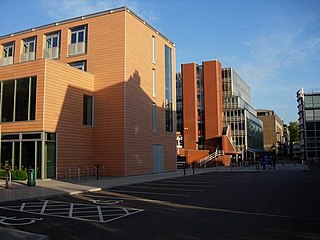
Beowulf is an Old English epic poem in the tradition of Germanic heroic legend consisting of 3,182 alliterative lines. It is one of the most important and most often translated works of Old English literature. The date of composition is a matter of contention among scholars; the only certain dating is for the manuscript, which was produced between 975 and 1025. Scholars call the anonymous author the "Beowulf poet". The story is set in pagan Scandinavia in the 6th century. Beowulf, a hero of the Geats, comes to the aid of Hrothgar, the king of the Danes, whose mead hall in Heorot has been under attack by the monster Grendel. After Beowulf slays him, Grendel's mother attacks the hall and is then defeated. Victorious, Beowulf goes home to Geatland and becomes king of the Geats. Fifty years later, Beowulf defeats a dragon, but is mortally wounded in the battle. After his death, his attendants cremate his body and erect a tower on a headland in his memory.
Old English literature refers to poetry and prose written in Old English in early medieval England, from the 7th century to the decades after the Norman Conquest of 1066, a period often termed Anglo-Saxon England. The 7th-century work Cædmon's Hymn is often considered as the oldest surviving poem in English, as it appears in an 8th-century copy of Bede's text, the Ecclesiastical History of the English People. Poetry written in the mid 12th century represents some of the latest post-Norman examples of Old English. Adherence to the grammatical rules of Old English is largely inconsistent in 12th-century work, and by the 13th century the grammar and syntax of Old English had almost completely deteriorated, giving way to the much larger Middle English corpus of literature.
Old English, or Anglo-Saxon, is the earliest recorded form of the English language, spoken in England and southern and eastern Scotland in the early Middle Ages. It developed from the languages brought to Great Britain by Anglo-Saxon settlers in the mid-5th century, and the first Old English literary works date from the mid-7th century. After the Norman conquest of 1066, English was replaced, for a time, by Anglo-Norman as the language of the upper classes. This is regarded as marking the end of the Old English era, since during this period the English language was heavily influenced by Anglo-Norman, developing into a phase known now as Middle English in England and Early Scots in Scotland.

In the United States, White Anglo-Saxon Protestants or WASPs is a sociological term which is often used to describe white Protestant Americans who are generally part of the white upper-class, historically mostly Mainline Protestant elite, though definitions may vary; typically or most consistently, White Anglo-Saxon Protestants are of British descent. WASPs have dominated American society, culture, and politics for most of the history of the United States. From the 1950s, the New Left criticized the WASP hegemony and disparaged them as part of "The Establishment". Although the social influence of wealthy WASPs has declined since the 1960s, the group continues to play a central role in American finance, politics and philanthropy.
The Seafarer is an Old English poem giving a first-person account of a man alone on the sea. The poem consists of 124 lines, followed by the single word "Amen". It is recorded only at folios 81 verso – 83 recto of the tenth-century Exeter Book, one of the four surviving manuscripts of Old English poetry. It has most often, though not always, been categorised as an elegy, a poetic genre commonly assigned to a particular group of Old English poems that reflect on spiritual and earthly melancholy.
Linguistic purism in English is the opposition to foreign influence in the English language. English has evolved with a great deal of borrowing from other languages, especially Old French, since the Norman conquest of England, and some of its native vocabulary and grammar have been supplanted by features of Latinate and Greek origin. Efforts to remove or consider the removal of foreign terms in English are often known as Anglish, a term coined by author and humorist Paul Jennings in 1966.

Dr. Francis Andrew March was an American polymath, academic, philologist, and lexicographer. He is considered the principal founder of modern comparative linguistics in Old English.

Rupert Leo Scott Bruce-Mitford, FBA, FSA was a British archaeologist and scholar, best known for his multi-volume publication on the Sutton Hoo ship burial. He was a noted academic as the Slade Professor of Fine Art at Cambridge University from 1978 to 1979, in addition to appointments at All Souls College, Oxford, and Emmanuel College, Cambridge.

Leeds Studies in English was an annual academic journal dedicated to the study of medieval English, Old Norse-Icelandic, and Anglo-Norman language and literature. It was published by the School of English at the University of Leeds. In 2020, it was announced that Leeds Studies in English would merge with the Bulletin of International Medieval Research to become Leeds Medieval Studies, based in the Leeds Institute for Medieval Studies.
Peter Dendle is a professor of English at Penn State Mont Alto, teaching classes on folklore, 20th and 21st century representations of the Middle Ages, Old and Middle English, and the monstrous. Dendle has written books and articles on a number of topics, including cryptozoology, philology, the demonic in literature, zombie movies, and Medieval plants and medicine. His work on zombies was featured by NPR.

The Department of Anglo-Saxon, Norse and Celtic is one of the constituent departments of the University of Cambridge, and focuses on the history, material culture, languages and literatures of the various peoples who inhabited Britain, Ireland and the extended Scandinavian world in the early Middle Ages. It is based on the second floor of the Faculty of English at 9 West Road. In Cambridge University jargon, its students are called ASNaCs.
Neil Ripley Ker was a scholar of Anglo-Saxon literature. He was Reader in Palaeography at the University of Oxford and a fellow of Magdalen College, Oxford until he retired in 1968. He is known especially for his Catalogue of Manuscripts Containing Anglo-Saxon, which is praised as a milestone in Anglo-Saxon manuscript study.

Michael James Swanton is a British historian, linguist, archaeologist and literary critic, specialising in the Anglo-Saxon period and its Old English literature.

Colin Robert Chase was an American academic. An associate professor of English at the University of Toronto, he was known for his contributions to the studies of Old English and Anglo-Latin literature. His best-known work, The Dating of Beowulf, challenged the accepted orthodoxy of the dating of the Anglo-Saxon poem Beowulf—then thought to be from the latter half of the eighth century—and left behind what was described in A Beowulf Handbook as "a cautious and necessary incertitude".
John Richard Clark Hall was a British scholar of Old English, and a barrister. In his professional life, Hall worked as a clerk at the Local Government Board in Whitehall. Admitted to Gray's Inn in 1881 and called to the bar in 1896, Hall became principal clerk two years later.

Caroline Agnes Brady was an American philologist who specialised in Old English and Old Norse works. Her works included the 1943 book The Legends of Ermanaric, based on her doctoral dissertation, and three influential papers on the Anglo-Saxon poem Beowulf. She taught at the University of California, Berkeley, the University of Pennsylvania, Johns Hopkins University, and Harvard University, among other places.
Constance Bartlett Hieatt was an American scholar with a broad interest in medieval languages and literatures, including Old Norse literature, Anglo-Saxon prosody and literature, and Middle English language, literature, and culture. She was an editor and translator of Karlamagnús saga, of Beowulf, and a scholar of Geoffrey Chaucer. She was particularly known as one of the world's foremost experts in English medieval cooking and cookbooks, and authored and co-authored a number of important books considered essential publications in the field.
Stanley B. Greenfield (1922–1987) was a distinguished Anglo-Saxonist. He was a founder of the International Society of Anglo-Saxonists and professor at the University of Oregon. He wrote not only on Anglo-Saxon themes but also later English literature. His 1967, Grammar and meaning in poetry was awarded the 1968 William Riley Parker Prize. Commenting on his work Brown (1987) notes Greenfield's insistence, when looking at Anglo-Saxon texts, on "the necessity of going back again and again to the text as source for interpretative strength."
Carol Braun Pasternack was a professor of medieval English literature and language at the University of California, Santa Barbara (UCSB) from 1988 to 2013. She chaired the Medieval Studies department, and was also Dean of Summer Sessions at UCSB in 2011–2013.
Lisa M. C. Weston is a scholar of medieval literature and Old English language. She teaches at Fresno State Department of English, and served as interim Chair of the department in 2019.








